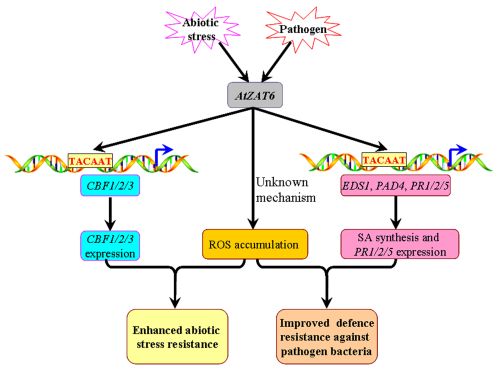
AtZAT6 Modulates Biotic and Abiotic Stress Resistances by Activating Salicylic acid-related Genes and CBFs in Arabidopsis
May 26, 2014 Email"> PrintText Size

In nature, plants live in complex environmental conditions in which various abiotic stresses and multiple microbial pathogens with different infection strategies and lifestyles influence plant growth and development. As sessile organisms, plants cannot avoid unfavorable circumstances by adjusting their location. Therefore, they have evolved complex strategies to perceive stress signals and further translate the perception into effective plant responses. Among these processes, multiple transcription factors played essential roles.
Dr. SHI Haitao from a research group led by CHAN Zhulong at Wuhan Botanical Garden
Firstly, they found that expression of C2H2- type ZFP AtZAT6 was transcriptionally induced by salt, dehydration, cold stress treatments and pathogen infection, and AtZAT6 was predominantly located in the nucleus. Secondly, AtZAT6 overexpressing plants exhibited improved resistance to pathogen infection, salt, drought, and freezing stresses, while AtZAT6 knockdown plants showed decreased stress resistance. Notably, AtZAT6 positively modulated expression level of stress related genes by directly binding to the TACAAT motifs in the promoter region of pathogen-related genes (EDSl, PAD4, PRl, PR2, and PRS) and abiotic stress responsive genes (CBFl, CBF2, and CBF3). Moreover, modulation of AtZAT6 also positively regulated the accumulation of salicylic acid (SA) and reactive oxygen species (H2O2 and O2·-).
Taken together, these findings indicated that AtZAT6 played important roles in plant development, and positively modulated biotic and abiotic stress resistance by activating the expression levels of salicylic acid-related genes and CBFs.
Results entitled “The Cys2/His2-type zinc finger transcription factor ZAT6 modulates biotic and abiotic stress responses by activating salicylic acid-related genes and CBFs in Arabidopsis” were published in Plant Physiology online.
This research was supported by the National Natural Science Foundation of China “the Hundred Talents Program”, and the Knowledge Innovative Key Program of Chinese Academy of Sciences, and by the National Natural Science Foundation of China, Youth Innovation Promotion Association of Chinese Academy of Sciences and the Outstanding Young Talent Program of Key Laboratory of Plant Germplasm Enhancement and Specialty Agriculture.

Model depicting the mechanisms of AtZAT6 involved in plant stress responses (Image by SHI Haitao)
In nature, plants live in complex environmental conditions in which various abiotic stresses and multiple microbial pathogens with different infection strategies and lifestyles influence plant growth and development. As sessile organisms, plants cannot avoid unfavorable circumstances by adjusting their location. Therefore, they have evolved complex strategies to perceive stress signals and further translate the perception into effective plant responses. Among these processes, multiple transcription factors played essential roles.
Dr. SHI Haitao from a research group led by CHAN Zhulong at
Firstly, they found that expression of C2H2- type ZFP AtZAT6 was transcriptionally induced by salt, dehydration, cold stress treatments and pathogen infection, and AtZAT6 was predominantly located in the nucleus. Secondly, AtZAT6 overexpressing plants exhibited improved resistance to pathogen infection, salt, drought, and freezing stresses, while AtZAT6 knockdown plants showed decreased stress resistance. Notably, AtZAT6 positively modulated expression level of stress related genes by directly binding to the TACAAT motifs in the promoter region of pathogen-related genes (EDSl, PAD4, PRl, PR2, and PRS) and abiotic stress responsive genes (CBFl, CBF2, and CBF3). Moreover, modulation of AtZAT6 also positively regulated the accumulation of salicylic acid (SA) and reactive oxygen species (H2O2 and O2·-).
Taken together, these findings indicated that AtZAT6 played important roles in plant development, and positively modulated biotic and abiotic stress resistance by activating the expression levels of salicylic acid-related genes and CBFs.
Results entitled “The Cys2/His2-type zinc finger transcription factor ZAT6 modulates biotic and abiotic stress responses by activating salicylic acid-related genes and CBFs in Arabidopsis” were published in Plant Physiology online.
This research was supported by the National Natural Science Foundation of China “the Hundred Talents Program”, and the Knowledge Innovative Key Program of Chinese Academy of Sciences, and by the National Natural Science Foundation of China, Youth Innovation Promotion Association of Chinese Academy of Sciences and the Outstanding Young Talent Program of Key Laboratory of Plant Germplasm Enhancement and Specialty Agriculture.

CAS Institutes
There are 124 Institutions directly under the CAS by the end of 2012, with 104 research institutes, five universities & supporting organizations, 12 management organizations that consist of the headquarters and branches, and three other units. Moreover, there are 25 legal entities affiliated and 22 CAS invested holding enterprisesThere are 124 I...>> more
Contact Us

Chinese Academy of Sciences
Add: 52 Sanlihe Rd., Xicheng District, Beijing, China
Postcode: 100864
Tel: 86-10-68597592 (day) 86-10-68597289 (night)
Fax: 86-10-68511095 (day) 86-10-68512458 (night)
E-mail: cas_en@cas.cn

